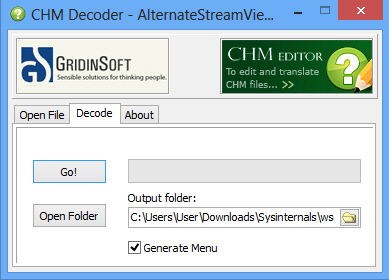CHM Decoder quickly converts CHM help files to HTML
 It’s been around since 1997, but Microsoft’s Compiled HTML Help (CHM) format is still often used for application help files, e-books and more. If you’re working on a PC then that’s no problem -- the files are easy to read -- but if you need to browse them on other platforms, then you might like to try CHM Decoder.
It’s been around since 1997, but Microsoft’s Compiled HTML Help (CHM) format is still often used for application help files, e-books and more. If you’re working on a PC then that’s no problem -- the files are easy to read -- but if you need to browse them on other platforms, then you might like to try CHM Decoder.
Point this small, free and portable tool at a CHM file, and it will quickly convert this into the original HTML. Open the root page and you’ll be able to browse it just like the original file. Only now it’s in a format which you can access almost anywhere.
There are other ways to do something similar, of course. If you’ve installed 7-Zip, for instance, then you can right-click a CHM file, select 7-Zip > Extract… and it’ll also decompile the file for you.
Where CHMDecoder wins out, though, is that by default it’ll also create a root menu. That is, you’ll see a tree on the left hand side, much as in the regular Windows Help viewer, where you can see and expand chapters, view page names, and click on any individual page to view it.
This approach can introduce minor problems on its own. Open the page in Internet Explorer, say, and its scripting might result in the browser complaining that it’s "restricted this page from running active content" (depending on your security settings).
If that does happen, though, just click "Allow Blocked Content" and you’ll see the Help file menu appear, top left.
CHM Decoder is strictly a single function tool, then. But it does at least perform that function very well. And if you need to make CHM content more accessible then the program should be able to help.
